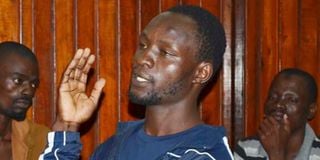Murder suspect Robert Kinusi has case to answer

Robert Waliaula Kinisu in a Mombasa court on August 3, 2016. He has been charged with the murder of Mtwapa businesswoman Jacqueline Ngina Kitheka.
The Mombasa High Court has ruled that Robert Kinisu Waliaula, in the news for the bizarre murders of two women, has a case to answer.
Judge Ann Ong'injo ruled that the State had established a strong case against the former convict for the murder of Mtwapa businesswoman Jacqueline Ngina Kitheka and hiding her body in a wardrobe.
"Based on the evidence of 11 prosecution witnesses, I am of the view that a prima facie case has been established against Kinisu; the suspect has a case to answer and he is hereby put on his defence," ruled Justice Ong'injo.
Mr Waliaula was visibly taken aback by the verdict, his face suddenly changing from relaxed to sad and surprised.
"I am now ready to defend myself," Mr Waliaula replied when asked by the court if he was ready to tell his side of the story.
While Mr Waliaula dealt with the shock of having to answer the charges, Kitheka’s former partner, Harry Harrington, who attended the court session remotely from the UK, showed a sense of relief, perhaps hoping that justice would finally be served.
Had it not been for the unfortunate murder of Kitheka, the two would have been happily married, as the killing occurred at a time when the couple were planning their wedding.
Kitheka, who lived alone in her flat in Mtwapa, was brutally murdered before her body was hidden in a wardrobe.
Her belongings were found to have been sold to a shylock, who positively identified Mr Waliaula in court as the person who sold him the stolen property.
According to court documents, the murder took place between May 3 and 6, 2021.
The court was presented with a wealth of evidence that the prosecution said linked Mr Waliaula to the woman's murder.
For example, the court was told how the suspect was traced through his mobile phone number, which investigators obtained from Safaricom using Kitheka’s mobile phone details.
Mr Waliaula was arrested while drinking a beer in Mtwapa township.
Since her phone had gone missing, investigators contacted her mobile Safaricom to trace the phone number, which her friends had given to the detectives.
Safaricom then provided the detectives with the details of the numbers Kitheka had communicated with prior to her death.
Through this process, the detectives led by Denis Isemek and Diba Halake narrowed down to a specific number that Kitheka had called before her death.
Hamisi Mohamed was the first to be arrested. He owned a shop in Mtwapa where he bought and sold household items and other property. His arrest led to the arrest of Mr Waliaula.
Mr Mohamed was later turned into a prosecution witness and testified against Mr Waliaula on how the suspect had sold the items to him.
Detectives had also received messages that led them to Mr Waliaula as a person of interest.
According to the messages, which were produced in court during the trial, Kitheka received death threats before her decomposing body was discovered in a wardrobe.
The messages recovered from her phone showed that she was living in fear because of the threatening texts she allegedly received from Mr Waliaula.
"The messages were sent from Mr Waliaula's phone to the deceased's phone," said Isemek, who was led by State Advocate Bernard Ngiri.
In one of the messages read in court, the suspect allegedly warned Kitheka that he was “ready for anything”.
The suspect also accused Kitheka of being a prostitute and of not looking after him despite him wandering around Mombasa City.
"The deceased did not report any threat to her life to the police," the officer said. Mr Isemek, who investigated the case, said they had confirmed that the phone used to send the threatening messages belonged to Mr Waliaula.
"From the information I received from Safaricom, I was able to retrieve messages sent from the suspect's phone to the deceased's number," he said during cross-examination by the suspect's lawyer, Derick Mwanzia.
In other messages, the suspect appeared to blame Kitheka for spending the night with unidentified people but asked for forgiveness.
"I apologise if I offended you but I am telling you the truth, let us not lie to each other. Did you tell me where you were and who you were with? Let me sort it out myself, which is fine. You, make the decision, do what you think is right.
That is all, it is up to you, have a good night," the message read in part.
According to Mr Isemek, these messages amounted to a threat to the deceased's life and therefore suggested the motive for the murder.
However, none of the messages submitted to the court contained Kitheka’s reply to the defendant's texts.
"These messages showed that the deceased had received threats from the suspect. They were sent from the suspect's registered number to the deceased's registered number," the officer said when asked by Mr Ngiri why these messages were relevant to the case.





